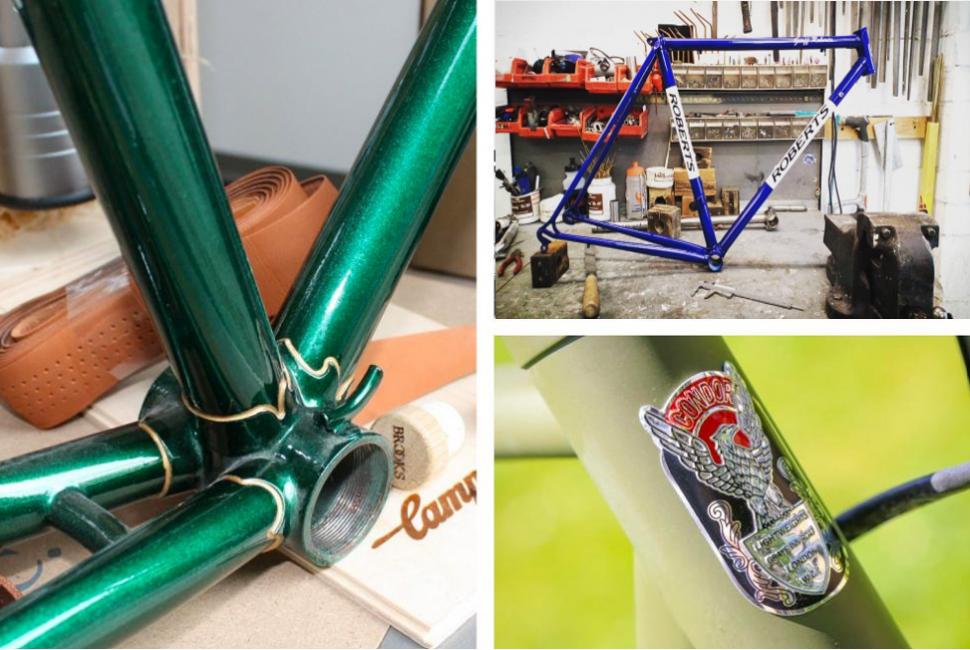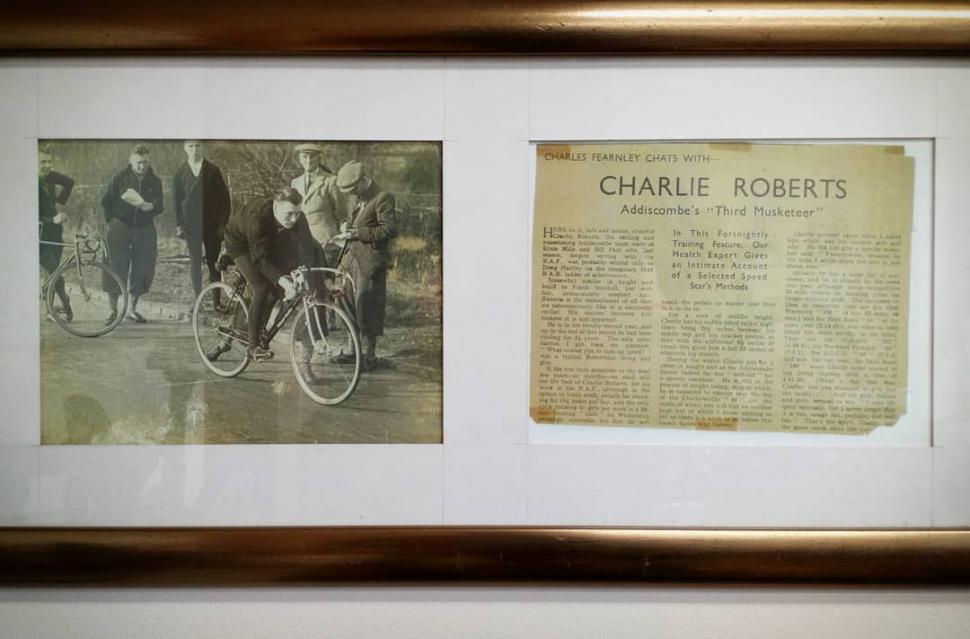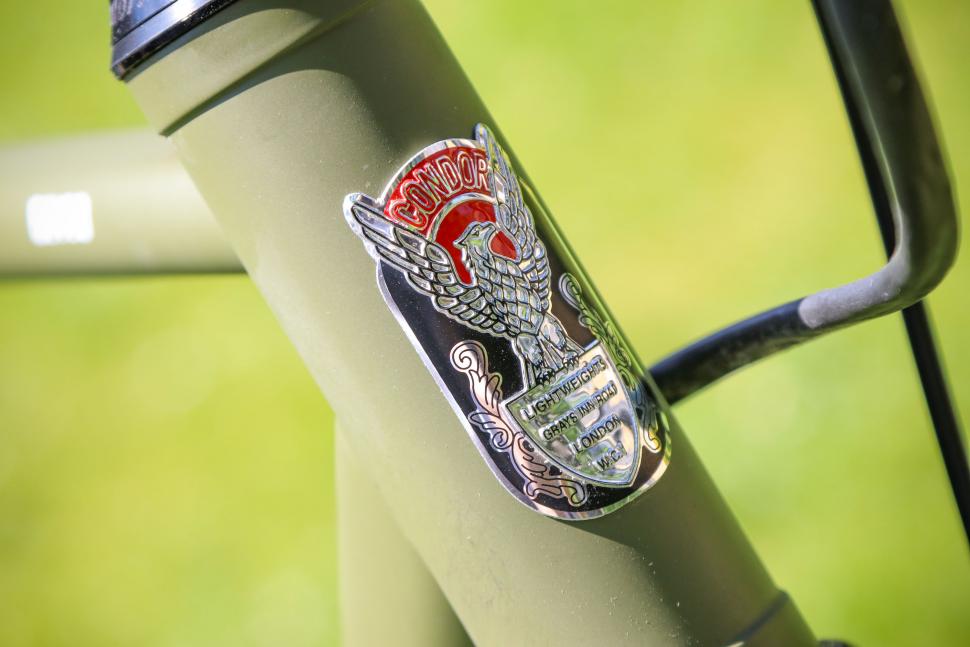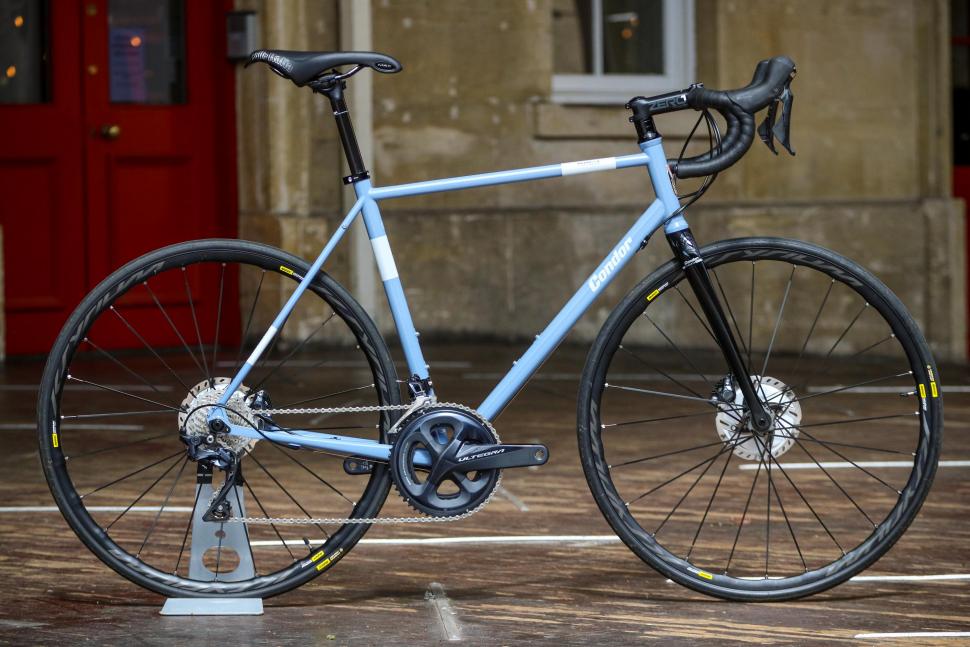- News
- Reviews
- Bikes
- Accessories
- Accessories - misc
- Computer mounts
- Bags
- Bar ends
- Bike bags & cases
- Bottle cages
- Bottles
- Cameras
- Car racks
- Child seats
- Computers
- Glasses
- GPS units
- Helmets
- Lights - front
- Lights - rear
- Lights - sets
- Locks
- Mirrors
- Mudguards
- Racks
- Pumps & CO2 inflators
- Puncture kits
- Reflectives
- Smart watches
- Stands and racks
- Trailers
- Clothing
- Components
- Bar tape & grips
- Bottom brackets
- Brake & gear cables
- Brake & STI levers
- Brake pads & spares
- Brakes
- Cassettes & freewheels
- Chains
- Chainsets & chainrings
- Derailleurs - front
- Derailleurs - rear
- Forks
- Gear levers & shifters
- Groupsets
- Handlebars & extensions
- Headsets
- Hubs
- Inner tubes
- Pedals
- Quick releases & skewers
- Saddles
- Seatposts
- Stems
- Wheels
- Tyres
- Health, fitness and nutrition
- Tools and workshop
- Miscellaneous
- Cross country mountain bikes
- Tubeless valves
- Buyers Guides
- Features
- Forum
- Recommends
- Podcast
feature
 southern steel Steve Thomas feature lead pic
southern steel Steve Thomas feature lead picSouthern Steel: take a trip down memory lane with these classic 20th century bike builders from the South of England
Until mass-produced aluminium bikes first came around in the 1980s, steel was still real when it came to frame building. Handbuilt was very much the way we rolled.
> 11 of the best British bike brands
There were some awesome frame builders around at that time, but sadly many fell by the ‘off the peg’ financial wayside of progress. In this two-parter, we’re looking at some of the classic British builders of the 20th century. Some of them are still around, some have prospered, some are unfortunately no more.
There were too many to mention in just one article – or even two, after we were inundated with requests after publishing our round-up of our 10 favourite British bike brands of the past – so we’ve had to cut it down to 10 makers from the south and 10 from the north. As this is a two-parter we've included one West Midlands maker in our southern round-up, which won't please you all but we had to draw the geographical line somewhere!
Anyway, saddle up and enjoy the ride down memory lane. While we can still remember how to find it…
Roberts
When you think of great frame builders from the south, the name Roberts stands out loud and proud.
Charlie Roberts was a London frame builder and accomplished time triallist who had been working for the likes of Holdsworth, Claude Butler and Freddie Grub up until World War 2, when he joined the Air Force.
After the war he returned to frame building with Holdsworthy, one half of the Holdsworth brand following a split in the business; and in 1964, he went into business making Roberts frames at his house in Sydenham. The rest, as they say, is history.
Roberts became a family affair, and Chas (Charles junior) took over the reigns from his father, and arguably transformed Roberts into a legendary and relevant brand during the 70s and 80s. Chas retired in 2015, but his brother Geoff Roberts keeps the family faith and still builds frames under his own name.
Hetchins Cycles
Famous for their curly rear stays and epic lugs, Hetchins frames are perhaps some of the most curious ever made. They’ve been highly collectable on both sides of the Atlantic for decades.
The company was set up in 1920s Tottenham by Russian immigrant Hyman Hetchin. In 1934 he went into partnership with a local frame builder who had come up with the idea of their trademark curly stays.
Hetchins bikes were not just pieces or art, and an Olympic track title was even one aboard one at the infamous 1936 Olympics. Hetchins have made more than 12,000 frames over the years, and although the brand has changed hands a couple of times, northern frame builder David Miller still produces ornate and curvy Hetchins-branded steelwork.
Bates Cycles
The names Bates has appeared on classic steel frames since way back in 1927. The company was founded a year earlier, and produced their first frames badged as Bates Cycles from their Swete Street (London E13) premises.
Horace, the founding Bates brother, was soon joined by his younger sibling Eddie (E.G). and they moved to a bigger site and started badging their bikes as Bates Brothers. Those frames were famous for their ‘cantiflex’ tubes, described by Martin Vincent of Classic Lightweights as "a responsive frame of unusually high rigidity while the front fork design was claimed to possess the ability to effectively absorb road shocks despite the short wheelbase and steep head angle."
After World War 2 Eddie went it alone, and the legendary EG Bates frames with their Reynolds tubing and decorative lugs were a prized thing to behold. They were still made right up until the company stopped trading in 2002.
Dave Russell
Dave Russell was a highly respected frame builder during the 70s and 80s. His frames were all crafted purely to order, and were mostly built with Reynolds tubing, especially in 753.
Numerous top riders of that era rode his frames to glory, even if they were often branded under different names. Dave started out working for Ron Kitching for many years, before opening his own bike sales and repair shop in Slough where he continued to hand build every frame himself (estimated at around 3,000 in all) before retiring.
Argos Racing Cycles
Bristol-based Argos have been making frames since 1974, when Arthur Needham first set up his business. Argos are still at it today, making, renovating and repairing their own frames and classics from other brands.
Although Argos frames were popular regionally, and also won several national titles through Stuart Dangerfield, for many years their biggest market was in exporting frames to the USA.
Roy Cottingham
Although he was a relatively small-scale builder, Roy Cottingham was a true master and artist when it came to turning steel tubes and lugs into highly ornate and practical frames.
A jazz-playing chemist by day and master craftsman by night, Roy would craft his lugs and file every single tube by hand and alone in his home workshop in Ringstead, Northants.
Roy was also an accomplished bike racer in his early days, and along with Peter Duker he also founded The League International. Sadly he passed away in his mid 50’s; a craftsman and a true gentleman was lost.
Jack Hearne
Jack Hearn was a well-known Chilterns based frame builder who started out producing frames from a small workshop in Stoke Poges (near to Slough). After World War 2 he started working at his uncle’s garage, where he drove the local taxi and also repaired bikes. This later led to him setting up his own shop and a very basic ‘jig-free’ workshop to build and repair frames.
From the 50s onwards his frames would grow in prominence, and during the 70s fellow villager Eddie Adkins would win national TT titles on Jack Hearne-built frames.
Alan Shorter
Born in 1917, Alan Shorter of Barnet was a keen and successful bike racer during the 40s & 50s, until he broke his leg and had to stop racing.
He had always been a great supporter of Barnet CC and its young and upcoming racers, and one in particular caught his attention – Alf Engers, one of the fastest short to middle distance time trial racers Britain has ever produced.
Alan was a superb frame maker, and several other builders worked with him over the years. He was synonymous with Alf’s amazing drilled and fluted flying machines.
The Shorter legacy still lives on through Shorter Rochford Cycles, who once sponsored Graeme Obree; another great rebel of cycling, much like Engers himself.
Major Nichols
West Midlands-based frame builders and bike makers Major Nichols were building and trading in lightweight bikes from 1947 right up until 2003. Their bikes were a regular fixture on club runs and at races all over the midlands during the 60s, 70s and 80s.
Major opened up his first bike shop just after World War 2, on the site of a bike business previously run by his father. After simply selling bikes to begin with, he taught himself frame building and started to make stock handmade frames.
Over the years he progressed from plain gauge Reynolds 531 tubing through to 753 building, and all were really stylish in build and finish. There are not so many Major Nichols frames still around nowadays, which is a real shame.
Condor
It’s amazing when you look at what London bike shop and frame builders Condor have achieved, and how they have not only stood the test time, but also prospered.
Monty Young first started trading bikes in 1948, and the company is now under the careful eye of his son Grant – a true family run success story. Condor originally built bikes on site, but in recent years they have started to produce their own frames in Italy. Condor frames have been ridden in the Tour de France, won World Championship medals – and even Mick Jagger was a fan.
Flight of the Condor
Condor still make up to 2,500 frames by hand per year. Of those a few hundred are totally custom with custom paint, custom geometry or both. 60% are built from steel (including stainless steel) and the rest are custom aluminium or carbon frames.
Condor believes their frames have only grown in popularity since the 80s, and prior to the 2008 financial crash they had some of their highest bike sales numbers ever. We asked Grant Young (now Chairman and the son of Monty Young who founded the company) for his thoughts on the 80s and 90s frame building era:
"In the nineties, we were fighting to build as many frames as we could. There were shops in America that wanted to take the whole production and we couldn't keep up.
“A decrease in UK frame building in the nineties was possibly down to the older generation of builders being unable to keep up with trends.
“It was impossible to teach older frame builders how to build in new materials and with new techniques. We tried to, we brought over carbon and bonding but it didn't really work.
“People went to China, and so we increased capacity by moving production to Italy so that we could make both in the UK and Italy and by hand; and with craftsmen, not on a production line.
“We didn't see a decrease, sales got stronger."
> Review: Condor Fratello Disc Thru Axle frameset
Condor also believe that cyclists have come to realise that a steel frame doesn't have to look vintage. It can look modern, and it won't ride like a frame from the 70s. It will ride better than the cheap aluminium frames of the 90s and the cheap carbon frames of the 2000s, and it will probably weigh less too.
Have we missed your favourite 20th century bike builder from the South of England? Let us know in the comments for the next update, and we'll see you in part 2 for our northern round-up.
Latest Comments
- David9694 3 sec ago
It's gradually dawning on drivers where they're getting to congestion-wise... ...
- chrisonabike 15 min 6 sec ago
Japan - luckily people can see what that's about through the power of the Internet. Short - not transferrable (although bringing in kei cars and...
- tony.westclassics@live.co.uk 36 min 15 sec ago
Just a rail with sliding hooks, about as safe as the property its fitted in ,plus over time damage to wheels, plus it doesnt stop parts being removed
- Hirsute 40 min 26 sec ago
All sorts of people are subject to hatred and othering under the fascist, nazi regime of trump and musk. I'm sorry I did not give a exhaustive list.
- ChrisA 45 min 44 sec ago
Blade Mews is private, so you have to ask why the council thought it reasonable to (legally) restrict cycling on a public right of way, that...
- Rendel Harris 2 hours 46 min ago
That's correct, but it raises an interesting question: if the defendant used a knife the starting point for a minimum term is twenty-five years, if...
- Born_peddling 6 hours 53 min ago
To be fair as much as I like to see decent public rack being put up just not at the cost of taking spaces like these specifically designed to allow...
- Hirsute 11 hours 17 min ago
You've missed the bit where it's going to court.
- froze 11 hours 41 min ago
The Silca is not that great, if you go online to Silca and look at the scale they use it is very poorly designed with the readings far to close...
- froze 11 hours 53 min ago
I gurantee you this is happening to millions of products sold all over the world.










Add new comment
23 comments
I had the pleasure of owning two of the featured builders here, in my history. When I joined the Army in 1971, I took with me my curly Hetchins: handed down from my older sister, and newly stove enammelled in bright yellow by DW Lindsey in Dundee, as a birthday pressie at age 14. Originally used for touring, but later stripped down and used for TT's (before the days of TT specials).
Later I was issued a Dave Russell framed bike, again for the TT discipline. A handful of these were sourced in Slough, just along the road from Arborfield in Berks, for the REME Apprentices College cycling team.
Later, in 1974ish, some ne'erdowell trashed my Hetchins so I was awarded the Russell to replace it. The Russell eventually got swapped in the early 80's for an all singing - all dancing photography flash unit and lightmeter combo (which I still own, all these years later).
I think I would have been better off keeping the Russell, but there you go.
H.R.Morris Walthamstow. Nicest person you could meet and built some nice frames and superbe wheels. Spent many Saturdays in his little shop while he was brazing a frame or lacing a wheel.
Tom Board (Condor, Paris). Built me a gorgeous chrome frame oversprayed in red when I was a schoolboy for around £160! I remember that he stirred the tea with a spanner and chain smoked.
If you came into cycling via 90's mountain biking the holy Steel trinity was always :
Chaz Roberts
Dave Yates (Lincoln) so squeezes in IMO.
Dave Lloyd (Oswestry) so honourable mention.
This is my Chas Roberts which I had custom built in 2000. It's the most comfortable bike I've ever ridden and I've taken it to Europe on several occasions. Over the years, I have had several modifications such as A-Head conversion, carbon forks and upgrade to 10 speed Shimano 105. It is a lovely bike and it is a shame that this type of bike is becoming a rare thing.
One of Chas Roberts frame builders was Winston Vaz. He has set up on his own now Chas has retired.
https://www.varonha.co.uk/
He built me a lovely bike in 853 with carbon fork 2 1/2 years ago.
Great thread, thanks.
+ 1 for Winston. He built a beautiful Varonha roadster (in 853) for my wife.
A mention for Bill Gray, regarded as one of the very top London builders: https://www.classiclightweights.co.uk/classic_builders/gray-bill/
Bill Hurlow, of East Kent, used to build for Condor. To me one of the absolute best.
But in that Era there were so many not mentioned.... Thanet, Pat Hanlon, Gillot, Lipscomb, Evans, Youngs, Mal Rees. Fred Dean, James. There, are so many.
What about Witcomb of Deptford, my first proper race bike in 1970. Also Bird Bros in Welling were very popular in the local clubs in the 70s, they later split to become Alec Bird in Orpington, whilst Ken Bird remained in Welling. I can still smell the tubulars hanging up on the ceiling, such nostalgia!
Could do this feature just on south London: Geoffrey Butler, TJ Quick, Youngs, Globetrotter, Evans (then still mainly in Waterloo), Chas Roberts, Geoff Roberts, the Birds, Whitcomb, Ron Cooper etc. Ron Cooper's workmanship is legendary.
As you say so many frame builders in South London at the time. A lot of them learned their trade at the Holdsworthy factory in Anerley where they built Holdsworth and Claud Bulter bikes. Winston Vaz mentioned above was one of them and his borther Keith Vaz, who had also worked for Holdsworthy set up a frame refinishing business based near Loughborough Junction in Brixton. Tom Quick used to frame repairs for me as did Chas Roberts. Ken Bird set up his shop in Anerley.
Also missed Knight of Wolverhampton!
If you are including the Midlands how on earth are Mercian missing from this list?
Because they think Derby is in the North. (Well, it is North of Watford Gap.)
Dave Russell had a shop in twyford before he started trading from Slough, from his actual home. Dave *loved* to talk. You had to set aside serious time for a visit to his shop because he'd get diverted by every new visitor. It was necessary to gently remind him why you were there from time to time if you wanted to make progress. Lovely guy.
What is this nonsense
"A decrease in UK frame building in the nineties was possibly down to the older generation of builders being unable to keep up with trends."
it was a "I won't it and I won't it now!" attitude.
I think the nicest London built frames I came across were built by Ron Cooper.
I desperately wanted a Ton Cooper when I was a junior. I have two now. He was a master craftsman.
There was something about his frames that just looked so right. There was nothing ornate about them but finish around the lugs and the joins on his lugless frames was exemplary. He upped sticks and moved to the States some time in the late 80s, if I remeber correctly, as almost all of his frames were being built for US customers.
Mercian?
My family had several MacLean bikes including a tandem from before WW2. Shop and bike building at The Angel Islington until 1962.
Pearson?
Been around since the 1890's
1860s, I think. I find it quite sad that they recently closed their Sutton store.
I think they moved to where the money was - Sheen's altogther more up-market. It's now Morrison's, but my wife's family used to refer to the hazards of 'going north of the Safeway line'. Pearson's was north of the line....